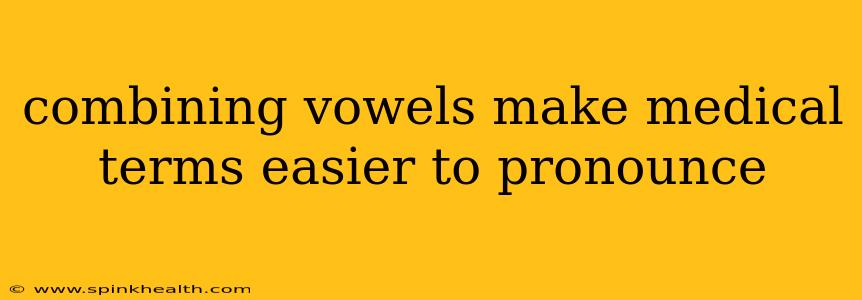Combining Vowels: The Secret Sauce of Medical Terminology Pronunciation
The world of medicine is filled with long, complex words that can sound like a foreign language to the uninitiated. But there's a hidden secret to unlocking their pronunciation, making them much less intimidating: vowel combinations. Think of them as the linguistic lubricant that smooths out the otherwise jarring sounds of medical terms. Let's embark on a journey to discover how these combinations work their magic.
Imagine you're a new medical student, facing a mountain of terminology. Words like "cardiopulmonary," "gastrointestinal," and "ophthalmoscope" might seem daunting. But understanding the role of vowel combinations can transform these intimidating words into pronounceable, even manageable, entities.
How Do Vowel Combinations Simplify Pronunciation?
Vowel combinations often create diphthongs or triphthongs—sounds where one vowel glides into another. These smooth transitions create a more natural flow, making the words easier to articulate. Instead of abrupt stops and starts, the vowels blend seamlessly, resulting in a clearer, more understandable sound.
For example, take the word "cardiopulmonary." The "io" in "cardio" and the "u" in "pulmonary" aren't pronounced as isolated vowels. Instead, they're combined, creating softer sounds that make the word flow more naturally. Breaking down the word syllable by syllable, focusing on these vowel combinations, allows for easier pronunciation.
What are some common vowel combinations in medical terms?
Common Vowel Combinations & Examples:
- ae: As in "aorta" - The "ae" diphthong creates a smoother sound than pronouncing each vowel separately.
- ea: As in "hepatocellular" - The "ea" creates a distinct, easier-to-pronounce sound compared to a hard "e" sound.
- io: As in "cardiovascular" - The "io" combination softens the pronunciation.
- eu: As in "leukocyte" - The "eu" creates a more flowing sound, making the word more pronounceable.
- oi: As in "lipoprotein" - The "oi" diphthong is a common and relatively straightforward combination.
Why are vowel combinations important for medical professionals?
Clear communication is paramount in healthcare. Mispronouncing a medical term could lead to confusion, misunderstandings, and, in extreme cases, even medical errors. Mastering vowel combinations allows medical professionals to communicate effectively with colleagues, patients, and families. It builds trust and confidence, demonstrating competence and expertise.
How can I improve my pronunciation of medical terms using vowel combinations?
Practical Tips:
- Break down words into syllables: Identify the vowel combinations within each syllable.
- Practice slowly: Focus on the smooth transition between the vowels in each combination.
- Listen to pronunciation guides: Many online resources and medical dictionaries provide audio pronunciations.
- Use flashcards: Create flashcards with medical terms, highlighting the vowel combinations.
- Practice with a partner: Have a colleague or friend quiz you on the pronunciation of medical terms.
Are there any resources available to help me learn medical terminology pronunciation?
Yes! Numerous online resources, medical dictionaries, and textbooks offer pronunciation guides and tutorials. Many medical schools and professional organizations provide training in medical terminology. Don't hesitate to utilize these resources; they are invaluable tools for mastering medical vocabulary.
Conclusion
Mastering vowel combinations isn't just about sounding more professional; it's about clear, concise, and safe communication within the medical field. By understanding how these vowel combinations work, you can unlock the pronunciation of even the most complex medical terms, improving communication and building confidence in your medical knowledge. So, embrace the power of vowels—they're your secret weapon in conquering the world of medical terminology!

